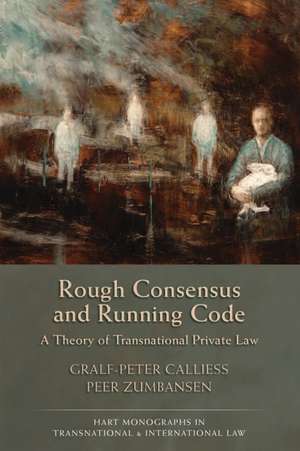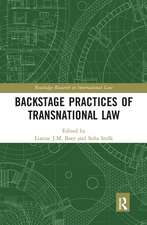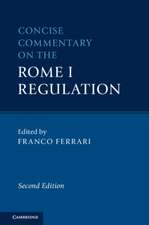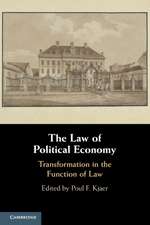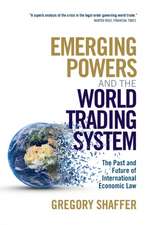Rough Consensus and Running Code: A Theory of Transnational Private Law: Hart Monographs in Transnational and International Law
Autor Gralf-Peter Calliess, Peer Zumbansenen Limba Engleză Paperback – 30 iun 2012
| Toate formatele și edițiile | Preț | Express |
|---|---|---|
| Paperback (1) | 262.09 lei 6-8 săpt. | |
| Bloomsbury Publishing – 30 iun 2012 | 262.09 lei 6-8 săpt. | |
| Hardback (1) | 572.63 lei 6-8 săpt. | |
| Bloomsbury Publishing – 30 mai 2010 | 572.63 lei 6-8 săpt. |
Din seria Hart Monographs in Transnational and International Law
-
 Preț: 320.53 lei
Preț: 320.53 lei - 27%
 Preț: 380.94 lei
Preț: 380.94 lei - 30%
 Preț: 568.40 lei
Preț: 568.40 lei - 30%
 Preț: 568.80 lei
Preț: 568.80 lei - 22%
 Preț: 233.46 lei
Preț: 233.46 lei - 27%
 Preț: 377.30 lei
Preț: 377.30 lei - 18%
 Preț: 317.05 lei
Preț: 317.05 lei - 30%
 Preț: 541.20 lei
Preț: 541.20 lei - 30%
 Preț: 602.92 lei
Preț: 602.92 lei - 16%
 Preț: 1077.89 lei
Preț: 1077.89 lei - 30%
 Preț: 777.47 lei
Preț: 777.47 lei - 30%
 Preț: 540.31 lei
Preț: 540.31 lei - 30%
 Preț: 543.00 lei
Preț: 543.00 lei - 22%
 Preț: 270.67 lei
Preț: 270.67 lei - 18%
 Preț: 299.86 lei
Preț: 299.86 lei
Preț: 262.09 lei
Preț vechi: 333.56 lei
-21% Nou
Puncte Express: 393
Preț estimativ în valută:
50.15€ • 52.64$ • 41.63£
50.15€ • 52.64$ • 41.63£
Carte tipărită la comandă
Livrare economică 10-24 aprilie
Preluare comenzi: 021 569.72.76
Specificații
ISBN-13: 9781849463546
ISBN-10: 1849463549
Pagini: 382
Dimensiuni: 156 x 234 x 15 mm
Greutate: 0.59 kg
Editura: Bloomsbury Publishing
Colecția Hart Publishing
Seria Hart Monographs in Transnational and International Law
Locul publicării:London, United Kingdom
ISBN-10: 1849463549
Pagini: 382
Dimensiuni: 156 x 234 x 15 mm
Greutate: 0.59 kg
Editura: Bloomsbury Publishing
Colecția Hart Publishing
Seria Hart Monographs in Transnational and International Law
Locul publicării:London, United Kingdom
Notă biografică
Gralf-Peter Calliess (LLB, PhD Göttingen, Habilitation Frankfurt) holds the Chair in Private Law, Comparative and International Economic Law, University of Bremen Faculty of Law. Professor Calliess is Director of the A4 Project ('New Forms of Legal Certainty in Globalized Exchange Processes') at the Collaborative Research Centre 'Transformations of the State'.Peer Zumbansen (Lic dr Paris; LLB., PhD law, Habilitation Frankfurt/Main; LLM Harvard,) holds the Canada Research Chair in Transnational Economic Governance and Legal Theory at Osgoode Hall Law School of York University, Toronto. Professor Zumbansen is the founder and director of the Critical Research Laboratory in Law & Society (www.criticalresearchlab.org) and co-founder/editor-in-chief of the German Law Journal (with Russell Miller, www.germanlawjournal.com).
Cuprins
Introduction 1. Law's Elusive Boundaries I. Border Crossings II. Towards a Legal Critique of Transnational Governance Institutions III. Law's Elusive Empire? 2. Towards A Theory of Transnational Private Law I. Seeing the (Global) World Through a Private Lawyer's Eyes A. Crucial Intersections: Lex mercatoria and Legal Pluralism B. Communities of Interest and Private Governance Regimes: The Conundrum of Transnational Commercial Law C. Markets as Regulators: It's the Economy, Stupid-Or, is It? D. Law and the Transformation of State Regulatory Functions II. Ubiquitous Law A. Normativity versus Realism: Law versus Power B. The Transnational: A Realm of Borderless Self-Regulation? C. Private Ordering and Public Authority: Scrutinising Democratic versus Economic Functions of LawIII. A Theory of Transnational Private Law A. Co-ordination versus Regulation: Revisiting the Public-Private Divide B. The Hybrid Character of Transnational Law Regimes C. The Governance Mode of Transnational Law Regimes (i) Mapping Economic Governance (ii) The Recombinant Governance Mode of Transnational Commercial Law D. Soft Law, Hard Law, and Legitimacy E. Rough Consensus and Running Code (i) Internet Governance: Legitimising Open Technical Standards (ii) Private Law Harmonisation (iii) Modern Customary Law (iv) The Making of Transnational Private Law 3. Transnational Consumer Contracts I. Private Ordering in B2C E-Commerce A. Online Reputation B. Trustmarks and Codes of Conduct C. Online Dispute Resolution D. Method of Payment and Credit Security II. Transnational Law Regimes: the Role of Virtual MarketplacesIII. Reflexive Consumer Protection Law A. Reflexive Trustmarks: Contractual Standards of Hybrid Organisations (i) Secondary Trustmarks at the National Level (ii) Supranational Standardisation via Co-Regulation? (iii) Global Linkage B. Law-Consumer Protection: ODR Standards and their Implementation(i) Guidelines for providers of ODR procedures (ii) The Implementation of Global ODR StandardsIV. RCRC in the Making of Transnational Consumer Contract Law 4. Transnational Corporate Governance I. Corporate Governance Codes A. Corporate Governance B. Corporate Governance and Political Economy C. Law-Making in Corporate Governance (i) The German Corporate Governance Code as an Example of RCRC (ii) Who Makes Company Law? (iii) Corporate Law Making Between State and Society (iv) The Reform of German Corporate Governance: The Intricacies of Rough Consensus and Running Code II. Transnational Corporate Governance and Executive Compensation A. The Transnational Embeddedness of European Corporate Governance Regulation B. 'New' and 'Experimentalist Governance' in European Corporate Law Regulation: RCRC as Transnational Legal Pluralism (i) The Polarities of EU Governance: Global Competitiveness and Political-Economic Integration (ii) Reflexive Corporate Governance (iii) European Corporate Governance Regulation and RCRC C. The Case of Executive Compensation (i) Breaking the Political Deadlock: Governance by Expertise (ii) Executive Compensation: Governance by Transparency D. 'Germany Inc' and Executive Compensation (i) The Political Economy of Corporate Governance Reform in Germany (a) Governing 'Germany Inc' (b) Hybridisation of Law-Making: The Return of the State? (ii) Transnational Corporate Governance as Spatio-Temporal Assemblage E. Transnational Corporate Governance Regulation as RCRC 5. Rough Consensus and Running Code in Context I. Law and Social NormsII. Soft Law A. Asking the Right Questions?B. Soft Law as EmbarrassmentIII. Customary International Law (And Its Limits) A. Elements of Customary International Law B. Ships Passing in the Night? C. The Attack on Customary International Law D. Customary International Law in the Making of Global Law IV. Transnational Private Law: Hard Law, Soft Law, Reflexive Law and the Conditions for Private Law-Making
Recenzii
...a sophisticated and thoughtful effort to renew and update our understanding of law to accommodate the challenging realities of globalise regulatory processes.
...one of the most striking feature of this work is its engagement with an impressive body of literature, from legal theory to sociology, economics and social sciences in general, in an attempt to embed the project in the broader debate of law in the global space. The result is an original, rich and highly complex book, which undoubtedly will, and in fact already is, stimulating debates and discussions over the nature and making of transnational law.... a must read for whomever wrestles in (or whomever seeks to enter) the rough arena of transnational law!
For anyone interested in how law works today, and the dynamic interaction of public and private norms and national and international processes in law's formation and application, Rough Consensus and Running Code is a must read. Its theorizing is rich and ecumenical in scope. The focus is on transnational private law, but the book is requisite reading for those interested in any area of law. Kudos to Calliess and Zumbansen!
The authors brilliantly bridge the growing gap between law and evolving transnational governance practice. They do this with great knowledge of the multiple scholarships that address the diverse elements of this rapidly expanding reality. By combining law with pertinent research from economics, sociology and anthropology, the authors expand the analytic terrain within which to address the slippery subject of global governance.
This path-breaking book offers an original take on the relationship between law and alternative forms of social ordering rooted in market and community activity. Engaging critically with the fast-growing literature on global legal pluralism from the vantage point of a range of disciplines, Calliess and Zumbansen take the reader beyond mere synthesis to offer nothing less than a rigorous and innovative theory of transnational law. Whilst their sub-title purports to confine the analysis to private law issues, they also address the most significant issues of public law relating to sovereignty, constitutionalism and legitimacy of supranational governance practices.
Every now and then a book comes along that makes one realise how truncated and hamstrung most prior studies of a subject have been. This is such a book. Demonstrating a rare fluency in both Continental and Anglo-American traditions of jurisprudence and social thought, the authors forge illuminating new pathways through and for transnational private law. Foremost among these is that laid by the authors' ingenious reengineering of "rough consensus and running code" for their purposes; those being to engage global regulatory challenges in all their complexity and dynamism. At once ambitious and rigorous, innovative and attentive, this is legal scholarship at its most exciting.
Rough Consensus and Running Code offers an important new perspective on the role of law in global governance. By taking legal pluralism seriously, it develops a nuanced and complex theory of transnational legal regulation. This is essential reading for anyone who wants to understand how transnational law works in theory and practice.
Sovereignty is fiction. State legislators have to navigate an ever rising tide of rules, acts of authority, norms and exercises of power beyond their control. Formal law has ceased to be the primary, or the privileged tool for governing society. Under the label of "transnational law", the authors resurrect the law as a social practice, and they herald in a more timely mission for the law as an academic discipline.
World society has long served as a hothouse for the frenzied and disorderly production of widely diverse and disparate legal and social norms. Against the background of current scholarly attempts to understand this process, Rough Consensus and Running Code brings us to a new level of awareness. Taking an original approach based on a holistic view of the making, application and enforcement of law, it provides not only a comprehensive overview of the current state of global law, but also a refreshingly efficient framework for the analysis of ongoing transnational legal processes. A milestone in modern legal scholarship.
In a world of multiple legal norms promulgated by international, state, and non-state entities, we need legal theories that offer guidance for managing the hybrid legal spaces that inevitably emerge. Seizing on the idea of rough consensus and running code, this wide-ranging book provides both useful case studies and generative metaphors for understanding and responding to this era of legal pluralism, in a wide variety of settings. This is definitely a must-read for those interested in transnational legal theory.
...one of the most striking feature of this work is its engagement with an impressive body of literature, from legal theory to sociology, economics and social sciences in general, in an attempt to embed the project in the broader debate of law in the global space. The result is an original, rich and highly complex book, which undoubtedly will, and in fact already is, stimulating debates and discussions over the nature and making of transnational law.... a must read for whomever wrestles in (or whomever seeks to enter) the rough arena of transnational law!
For anyone interested in how law works today, and the dynamic interaction of public and private norms and national and international processes in law's formation and application, Rough Consensus and Running Code is a must read. Its theorizing is rich and ecumenical in scope. The focus is on transnational private law, but the book is requisite reading for those interested in any area of law. Kudos to Calliess and Zumbansen!
The authors brilliantly bridge the growing gap between law and evolving transnational governance practice. They do this with great knowledge of the multiple scholarships that address the diverse elements of this rapidly expanding reality. By combining law with pertinent research from economics, sociology and anthropology, the authors expand the analytic terrain within which to address the slippery subject of global governance.
This path-breaking book offers an original take on the relationship between law and alternative forms of social ordering rooted in market and community activity. Engaging critically with the fast-growing literature on global legal pluralism from the vantage point of a range of disciplines, Calliess and Zumbansen take the reader beyond mere synthesis to offer nothing less than a rigorous and innovative theory of transnational law. Whilst their sub-title purports to confine the analysis to private law issues, they also address the most significant issues of public law relating to sovereignty, constitutionalism and legitimacy of supranational governance practices.
Every now and then a book comes along that makes one realise how truncated and hamstrung most prior studies of a subject have been. This is such a book. Demonstrating a rare fluency in both Continental and Anglo-American traditions of jurisprudence and social thought, the authors forge illuminating new pathways through and for transnational private law. Foremost among these is that laid by the authors' ingenious reengineering of "rough consensus and running code" for their purposes; those being to engage global regulatory challenges in all their complexity and dynamism. At once ambitious and rigorous, innovative and attentive, this is legal scholarship at its most exciting.
Rough Consensus and Running Code offers an important new perspective on the role of law in global governance. By taking legal pluralism seriously, it develops a nuanced and complex theory of transnational legal regulation. This is essential reading for anyone who wants to understand how transnational law works in theory and practice.
Sovereignty is fiction. State legislators have to navigate an ever rising tide of rules, acts of authority, norms and exercises of power beyond their control. Formal law has ceased to be the primary, or the privileged tool for governing society. Under the label of "transnational law", the authors resurrect the law as a social practice, and they herald in a more timely mission for the law as an academic discipline.
World society has long served as a hothouse for the frenzied and disorderly production of widely diverse and disparate legal and social norms. Against the background of current scholarly attempts to understand this process, Rough Consensus and Running Code brings us to a new level of awareness. Taking an original approach based on a holistic view of the making, application and enforcement of law, it provides not only a comprehensive overview of the current state of global law, but also a refreshingly efficient framework for the analysis of ongoing transnational legal processes. A milestone in modern legal scholarship.
In a world of multiple legal norms promulgated by international, state, and non-state entities, we need legal theories that offer guidance for managing the hybrid legal spaces that inevitably emerge. Seizing on the idea of rough consensus and running code, this wide-ranging book provides both useful case studies and generative metaphors for understanding and responding to this era of legal pluralism, in a wide variety of settings. This is definitely a must-read for those interested in transnational legal theory.
Descriere
Rough Consensus and Running Code describes and analyses different law-making regimes currently observable in the transnational arena.
